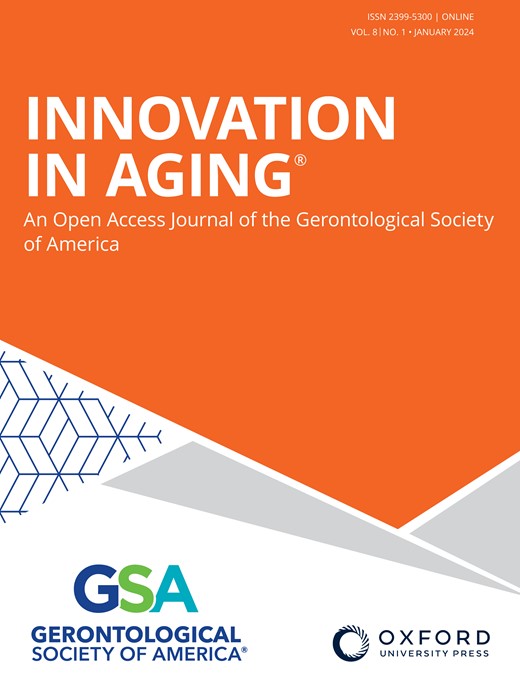研究人员当心:关于欺诈性研究参与者的警示故事及应对措施
IF 4.9
3区 医学
Q1 GERIATRICS & GERONTOLOGY
引用次数: 0
摘要
摘要 本次研讨会介绍了老年学研究人员发现参与研究的欺诈性参与者和机器人的一系列案例。这些报告描述了参与者虚假陈述和创造性地注册研究以获得经济奖励的复杂性质。Sefcik 博士分享了滚雪球样本如何导致参与者在虚拟定性访谈中注册研究并进行虚假陈述。Boon 博士揭示了 Facebook 招聘如何导致机器人回复,以及为识别参与者是否真实而采取的措施。Frechman 博士揭示了社交媒体平台和电子邮件分发列表上的招募是如何导致机器人攻击研究调查的。Carpenter 博士解释了一项涉及多种方法的研究,在这项研究中,机器人完成了几项调查,而受访者给出了无意义的回答。Wallace 博士解释了发生的两种欺诈活动,第一种是机器人完成在线调查,第二种是在访谈中进行欺骗。所有演讲者都讨论了他们在怀疑研究参与中存在欺诈行为时的经历、如何验证参与者的方法、解决虚假陈述的行动步骤、维护研究完整性的流程,以及减少未来欺诈行为的技巧。本讲座由老年人护理兴趣小组主办。本文章由计算机程序翻译,如有差异,请以英文原文为准。
RESEARCHERS BEWARE: CAUTIONARY TALES OF FRAUDULENT RESEARCH PARTICIPANTS AND WHAT TO DO ABOUT THEM
Abstract This symposium presents a series of cases where gerontological researchers identified fraudulent participants and bots engaging in their studies. These presentations describe the complex nature of participants misrepresenting themselves and being creative to enroll in studies for financial incentives. Dr. Sefcik shares how a snowball sample led to participants enrolling in a study and misrepresenting themselves during virtual qualitative interviews. Dr. Boon illuminates how Facebook recruitment led to bot responses and steps taken to identify if participants were real. Dr. Frechman reveals how recruitment on social media platforms and email distribution lists led to bot attacks of the study survey. Dr. Carpenter explains a study involving a multi-methods approach in which a bot completed several surveys and an interviewee gave nonsensical responses. Dr. Wallace explains two types of fraudulent activity occurring, the first with bots completing an online survey and the second with deception during interviews. All presenters discuss their experiences of suspecting fraudulent research participation, approaches on how they verified participants, action steps to address misrepresentation, processes put in place to uphold the integrity of their studies, and tips to mitigate future fraud. This is a Nursing Care of Older Adults Interest Group Sponsored Symposium.
求助全文
通过发布文献求助,成功后即可免费获取论文全文。
去求助
来源期刊

Innovation in Aging
GERIATRICS & GERONTOLOGY-
CiteScore
4.10
自引率
0.00%
发文量
72
审稿时长
15 weeks
期刊介绍:
Innovation in Aging, an interdisciplinary Open Access journal of the Gerontological Society of America (GSA), is dedicated to publishing innovative, conceptually robust, and methodologically rigorous research focused on aging and the life course. The journal aims to present studies with the potential to significantly enhance the health, functionality, and overall well-being of older adults by translating scientific insights into practical applications. Research published in the journal spans a variety of settings, including community, clinical, and laboratory contexts, with a clear emphasis on issues that are directly pertinent to aging and the dynamics of life over time. The content of the journal mirrors the diverse research interests of GSA members and encompasses a range of study types. These include the validation of new conceptual or theoretical models, assessments of factors impacting the health and well-being of older adults, evaluations of interventions and policies, the implementation of groundbreaking research methodologies, interdisciplinary research that adapts concepts and methods from other fields to aging studies, and the use of modeling and simulations to understand factors and processes influencing aging outcomes. The journal welcomes contributions from scholars across various disciplines, such as technology, engineering, architecture, economics, business, law, political science, public policy, education, public health, social and psychological sciences, biomedical and health sciences, and the humanities and arts, reflecting a holistic approach to advancing knowledge in gerontology.
 求助内容:
求助内容: 应助结果提醒方式:
应助结果提醒方式:


